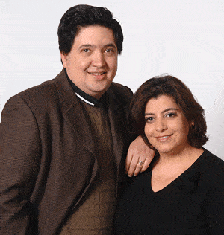Interpreting for a living

It’s not uncommon for Antonio Bañuelos and his wife, Mayra Moriel, to run into a client after Sunday Mass at Our Lady of the Americas Parish in Des Moines.
“It’s very rewarding to see a client we had who thanks us,” said Bañuelos, who with Moriel launched an interpreting and translation service, Mayan Business Solutions, nine years ago. In many instances, they meet their clients during workers’ compensation proceedings.
“We’ve had cases where a person lost a hand or a limb in an accident,” Bañuelos said. “Because of our services, they were able to understand the workers’ compensation process they were going through, and that helped them to regain hope.”
What began as a side venture for the young professionals, who became U.S. citizens two years ago, has grown into a successful small business that provides interpreters in several Iowa cities.
“It’s a no-barrier industry,” said Bañuelos, who said about 80 percent of their work is related to medical visits for workers’ compensation cases. “It wasn’t hard for us to enter the industry, but it is hard to keep up with it.”
A native of Chihuahua, Mexico, Bañuelos first came to the United States when he was 18 to attend the University of Texas at El Paso on a computer engineering scholarship. After he graduated in 1997, Principal Financial Group Inc. hired him and sponsored him to work in Des Moines. After 10 years at Principal, he joined Iowa Health System three years ago as a computer engineer. Moriel, whom Bañuelos sponsored to come to Des Moines in 1998, had worked for the Iowa Coalition Against Sexual Assault for nearly five years before leaving the nonprofit two years ago to work full time in their business.
Bañuelos handles the contracting and bookkeeping ends of the couple’s business, scheduling their own appointments as well as hiring subcontractors, while Moriel does the interpreting and translation work, handling up to a dozen assignments per week.
Refugee languages
Relatively few interpreters have established full-time businesses in Greater Des Moines, said Stephanie Hingtgen, international language programs manager for the Iowa Council for International Understanding (ICIU). The organization, which has provided interpretation and translation services since 1968, works with a network of approximately 100 interpreters that it hires as independent contractors.
“What often happens is that someone may start interpreting informally for family and friends, so they’ve already been doing it for a number of years,” Hingtgen said. In considering interpreters, “we look primarily at past experience,” she said.
With the exception of Spanish, which is still the top language interpretation need in Central Iowa, demand is strongly correlated with the influx of refugee populations, she said. That means the languages in highest demand among about 50 offered include Arabic, which is spoken by Iraqis as well as Sudanese refugees, along with Bosnian, Lao, Somali, Swahili and Vietnamese. Burmese also has been a growing interpretation need locally.
Typically, demand for interpreters skilled in a particular language is greatest during the early phases of an immigration wave for a nationality speaking that language, Hingtgen said. “Fortunately I have been able to connect, usually through other interpreters, with members of the community who have studied English or are college-educated,” she said. “Or they have done a tremendous job of learning the language after they arrived a few years ago. But it is a challenge.”
Among the interpreters she contracts with is Magdy Salama, who has served full time in that role since retiring from Liberty Mutual Insurance Co. in Des Moines, where he had worked for 28 years. A native of Egypt, Salama came to the United States to work for what was then Hawkeye-Security Insurance Co. in 1976. As an interpreter, Salama provides services for Mercy Medical Center – Des Moines, the 5th Judicial District courts, the Des Moines Police Department, the Iowa Department of Human Services and a number of other organizations through ICIU.
The top interpretation needs, Salama said, echoing Bañuelos and Hingtgen, are medical- and legal-related business for clients.
“There is more than the barrier of the language,” Salama said. “Whether it’s in a clinical or legal setting, I’m an advocate for them as well. I feel it’s a rewarding service, because I help other people to get their necessities and to communicate well.”
The Arabic language has many distinct dialects, ranging from that spoken by Iraqis to a much different version spoken by Sudanese refugees, said Salama, who said he understands about 20 different Arabic dialects. “So that’s why it’s very critical when you request an Arabic interpreter, you have to be very clear about what nationality needs the service,” he said. Correspondingly, he often has back-to-back appointments, and is already scheduling work as far ahead as next September.
Salama, who will turn 70 on Feb. 27, established his business as a sole proprietorship in 2004. “It keeps me busy and active, instead of sitting around and being a couch potato,” he said with a laugh.
Subcontractors
Typically insurance companies will hire national interpretation companies to handle workers’ compensation cases, Bañuelos said. Those agencies then subcontract with companies such as his to handle cases locally, by searching the American Translators Association or the Iowa Interpreters and Translators Association online directories.
“Usually the first or second time they call you, it’s at the last minute, as a last resort,” he said. “But then they put you on their call list and you become a regular.” Mayan charges the national companies between $35 and $45 an hour, with a two-hour minimum per assignment, he said.
Their company has also developed subcontractor relationships of its own.
“We’re subcontracting in Des Moines for Vietnamese, Arabic and Bosnian interpreters,” Bañuelos said. “We also have lists of subcontractors for several other Iowa cities.”
His wife’s background as a nutritionist has been helpful in interpreting medical terms for their assignments, Bañuelos said. She has a degree in nutritional sciences from the Universidad Autonoma de Chihuahua and is now working toward a master’s degree in counseling from Drake University, where Bañuelos received his M.B.A.
As with many new businesses, establishing a reputation was one of the biggest hurdles, and Mayan just broke even the first several years. In each of the past two years, however, business has doubled from the previous year.
Looking ahead, “our goals are to get a better network of contractors across the state,” Bañuelos said. “I think having a better network will work both ways; they can then send us business in Des Moines. We want to have a better presence with the local insurance companies to do workers’ compensation work for them so that we become a preferred choice.”










